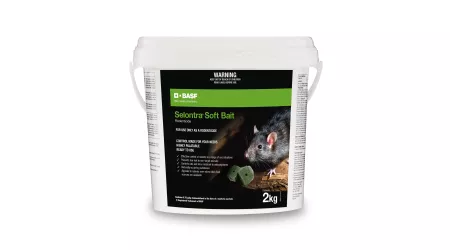Controlling pests within a conservation reserve is a particularly important and sensitive job.
The whole of Stewart Island/Rakiura is a haven for kiwi and other vulnerable native species, but Mamaku Point Conservation Reserve takes their protection to the next level. A predator-proof fence across its neck generally prevents rodents, feral cats, deer and possums from getting onto the 172-hectare headland.
The reserve’s conversion from partial farmland began in 2000. Decades of isolation have allowed native flora and fauna to thrive – so much so that the Reserve’s General Manager Antony Simpson now has over 120 native species to protect, including 26 native birds and bats as well as invertebrates. Antony
says he can never afford to take their safety for granted. “Mamaku Point is a bit of a candy store, with everything lush and flourishing. All the animals outside want to get in and the fence stops at the high tide mark, so predators can still get around the ends at low tide.”
“Thermal AI cameras are set up at the fence ends to show us what does comes in. So when we see them come around the fence ends we respond with bait stations and targeted trapping.”
The reserve’s second line of defence is a biosecurity grid of 21 bait lines and 600 bait stations laid out in a grid of 100 metres by 50 metres. Antony says he and his team catch about 5 possums a year, but the greater threat is from rats and cats. There’s a rat plague on the rest of the island every 4 or 5 years. As rat numbers go up, so do cat numbers.
Rats in the Reserve are a triple threat: they eat seeds to reduce plant growth and food for the native fauna, they eat eggs to disrupt the native birds’ lifecycle, and they lure in cats.
Antony says the Reserve’s pest management program has been massively strengthened since the formation of the Mamaku Point Conservation Trust in 2017.
“The place has gone from strength to strength,” he says. “It was previously all locked up with the bare minimum of pest control inside the fence. Now we’re giving it the A-plus treatment.”
A recent further upgrade to that A-plus regime came courtesy of BASF in late 2022. Geoff Booth, BASF’s Otago and Southland Territory Manager, has been a regular visitor to the island and has a background in pest control and conservation work. Impressed by what Antony is achieving, Geoff was able to arrange the donation of a large quantity of Selontra® Soft Bait Rodenticide to the Reserve with the valuable support of Rakiura Shipping, whose Foveaux Freighter carried the cargo free of charge.
The big advantage of using this highly palatable Selontra solution in such a sensitive environment is the limited likelihood of adverse exposure to non-target animals via secondary poisoning. Selontra works fast, quickly stops rodents feeding once they’ve consumed a lethal dose, thanks to its “stop-feeding effect”, and – unlike anticoagulants – is neither persistent nor bio accumulative.
For Antony, the timing seemed perfect. “We were using brodifacoum, a second generation anticoagulant, but looking for alternatives because brodifacoum persists in the environment.”
Antony says all the signs are that Selontra is working really well. “We’ve been using it for a year and a half now and it’s looking good. Rats seem to like it. They’ve been taking the baits, and we’re not catching too many in the traps or seeing many rats about. There’s plenty of plant growth, which suggests the rats aren’t eating all the seeds, so the birds are flourishing. It’s win/win really.”
As Antony points out, the property is covered in bush, so there’s no way of quantifying Selontra’s impact and being certain that the population density has been reduced until the next round of monitoring in August. Given the positive visual evidence, though, it seems safe to say that Selontra has earned its place as part of Antony’s ‘A-plus’ control program in one of the most challenging pest control environments in the country.

